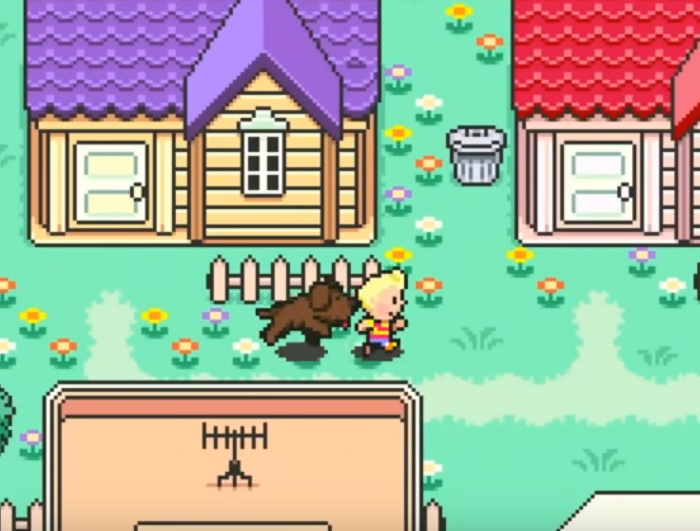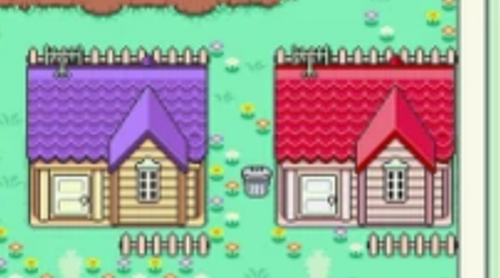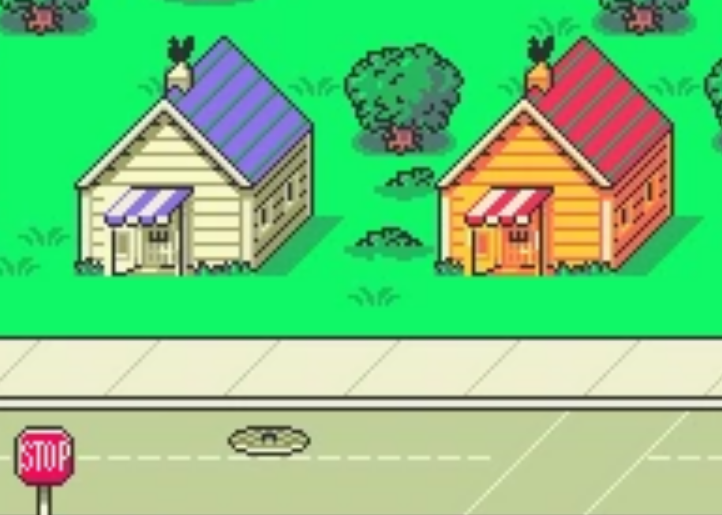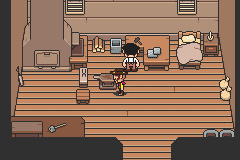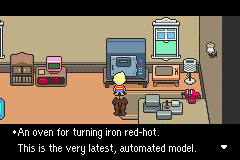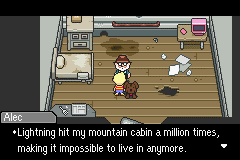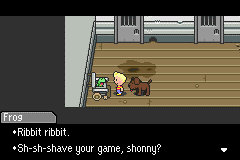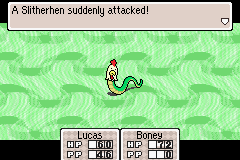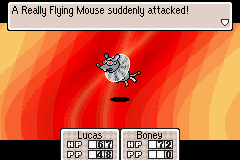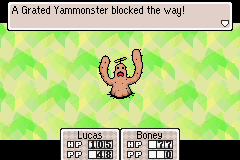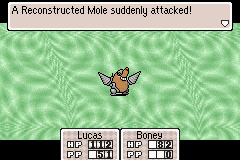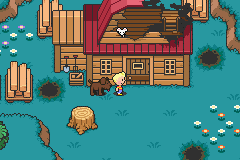Part 13: Exploring the New Tazmily
We are shown various memories of the past. Lucas walked to the cemetery with Claus, tears running down his face. Lucas admitted he let Claus run away to take revenge on the Dragos, before himself running away in shame. These were the only times he had been part of the story up until now. The whole time Duster was chasing after the Egg of Light and Fassad was chasing after him, Lucas took time for some deep reflection. He’s still heartbroken over the loss of his mother, but he has matured greatly. Lucas is now in his teenage years when we see him again, and his sprite image reflects that.
The song that played during this flashback was the Mother 3 Love Theme, and you’re going to hear a lot more of it from now on. When part of a song, such as the melody, is reused and remixed for different scenarios, it’s called a leitmotif. Shogo Sakai likes to use leitmotifs a lot in this game, especially with the Love theme and Pigmask theme.
The title of Chapter 4 is revealed – please don’t laugh at it:
Chapter 4: Club Titiboo
The translators didn’t want to mess around with the original Japanese names of things too much. As a result, we get Club Titiboo. From now on, I’ll just be referring to it as “the Club,” if you don’t mind. We’re immediately sent to another cinematic sequence:
Over the span of 3 years, lightning has struck the sheep pen. Two of the sheep are now black as a result.
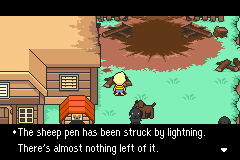
What looks like a tourist (simply named, “Guy”) is found right outside Lucas’s home, marveling at the famous “Lightning House.” The Pigmask standing beside him assumes that Lucas must be living a miserable life if his sheep pen got struck by lightning and he still doesn’t want a Happy Box. This interaction has a lot to unpack. First, it establishes that Pigmasks are no longer hidden from sight, and are openly patrolling the town. Since the tourist doesn’t seem phased by a man in a pig suit standing next to him, it can be assumed that nobody minds them. Secondly, the Pigmask implies that his house was struck by lightning because he never got a Happy Box, which means Fassad’s “hunch” about daily lightning strikes was indeed real, and is somehow used as a weapon against those who don’t want “happiness.” Thirdly, because this Pigmask is out in the open, and that Lucas’s house was struck by lightning, I think it’s safe to assume that most people by now have a Happy Box in their home, which means Fassad’s work was an outstanding success.
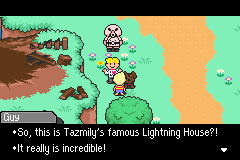
Just a few steps further, there’s another NPC (non-player character) named “Old Guy” who claims that the area surrounding Flint and Lucas’s house is the only part of town to have never changed. When you enter the town square, everything is different. Thomas’s Bazaar is no longer operated by Thomas, but by his son, Nichol, who also works at a factory. And at this Bazaar, you can no longer take items for free; everything must be purchased. The things you can buy are no longer survival items, but pieces of entertainment, like gumballs and various “knick-knacks,” as the game puts it. Bronson’s anvil and hand tools have now been replaced with more modern equipment, like vices and ovens.
The Yado Inn has now turned into the Yado Hotel. Instead of only having 3 rooms, it now has multiple floors for people to stay in. Inside, a man named “Man” tells Lucas about the bassist of a band called DCMC, who, despite looking like a bum, is quite skilled.
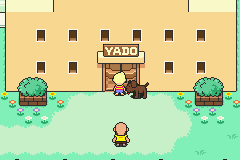
Caroline, who’s had an interest in baking throughout the game, now has her own bakery shop. As you can see, Fuel is also all grown up now.
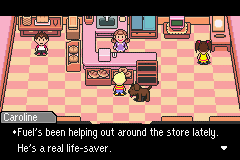
In the town square, the well is no longer there; it has been removed for Fassad to have a platform for his speeches. Apparently, he survived the Drago attack. If you try to talk to him, he ignores you. Jill says, “Whenever I listen to Mr. Fassad talk, I suddenly want everything. It’s almost like he’s a magician. *giggle*”
Lisa says, “It’s nice to think of others and all, but it’s more important to think of your own happiness.”
Brenda will mention that Flint, after all these years, is still going up the mountain daily to look for Claus, and that it’s about time he gives up.
There’s also a save frog driving around in a car now.

Mayor Pusher’s house has become much more extravagant, and is filled with all sorts of luxuries, like a great big wide-screen-flat-screen TV. He has a Happy Box too, of course.
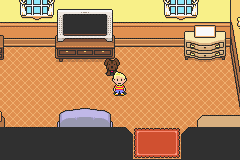
In Abbot and Abbey’s house, you can find other objects of the “Happy” brand, such as a Happy Teddy Bear and a Happy Cooling Box.
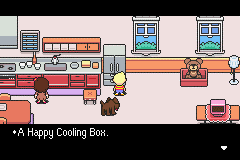
The song that plays in the new Tazmily is a remix of the song that played in Alec’s yard during the prelude. When I analyzed that song, I said it sounded “active and alive.” This version of the song doubles down on that feeling (that’s probably why it’s used here). The part that comes in around 20 seconds very well symbolizes Tazmily’s new prosperity. This song uses less of the Love Theme than the original version, which makes sense, because it’s not all about Lucas’s family this time. Instead of the electric guitar continuing the Love Theme, it uses the melody from when you ride in a Pork Bean, which was highly advanced. As Tazmily is now “advanced,” this is a fitting replacement.
Reggie’s tent is no more – it seems to have just recently been struck by lightning. A Pigmask at the scene says “Pay attention! Let this be a lesson! Punishment falls upon the homes of all bad guys!” Not only are people without Happy Boxes “unhappy,” but they’re explicitly labeled as enemies.
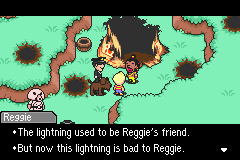
The jail now has inmates. A policeman is shocked by the fact that law enforcement wasn’t around 3 years ago. When you talk to the guy behind bars, he says he was arrested for larceny, stating that all he did was pick up some doorknob he found on the ground. This is a reference to the doorknob that Thomas pulled off Flint’s door at the beginning of the game. Also, what’s that dog doing there in the picture? He actually went into the cell on his own free will and doesn’t want to come out.
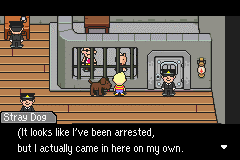
In Bob’s house, he’ll say to you, “Out taking your dog for a walk? You must really think you’re someone special. Seriously, you don’t even work. Even kids are working at the factory nowadays you know.” In fact, most people Lucas talks to will either mention how he doesn’t have a Happy Box or how his house keeps getting struck by lightning because he doesn’t have one.; they look down on him because of that.
At the beach, you can find a man in a suit-shaped swimsuit, along with an actual pig sunbathing.
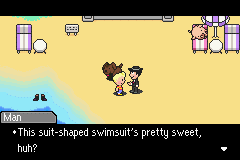
You can find Nana looking out into the ocean like she always has been – she has a lot of things to tell Lucas:
In the eastern side of town, there is a new nursing home where Wess and Duster’s house used to be. I don’t know if “new” is the best way to describe it, though… The sign in front of the building says: “Special Nursing Home for Senior Citizens – ‘Old Man’s Paradise,’” but when you go inside…
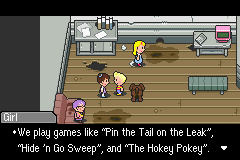
It clearly isn’t being well taken care of. Upstairs, you can visit some of the elderly folks. Their doors look like those of prison cells. There’s also a funny little save frog in a wheelchair, who asks if you’d like to “shave” your game. Up there, you can talk to Alec, Wess, and Mike, who once gave Flint some not very tasty, slightly unclean cookies. Alec notes that he couldn’t live in the mountains anymore – not because he was too old, but because lightning was relentlessly striking his house. Wess will comment that Fassad has “screwed everything up in every way possible.” I don’t know about that – has he seen the happiness that everyone’s received recently? Maybe these old people are too stuck in their ways; no wonder they live in such miserable apartments.
I should also note that the music in this building (A Little Elegy) is a slower version of the song that normally plays in people’s houses. I guess now is a better time than ever to show off Mother 3’s use of leitmotifs. So far, there are 4 variations of one song that plays in houses, and more to come. The first version plays in Alec’s house, which is now burnt down. The second one plays in everyone’s house from chapters 1-3, the third one plays in everyone’s house after the 3-year time skip, and the fourth one plays in the nursing home.
Shogo Sakai likes to use the same melody for multiple songs. This way, there is a clear connection between songs. In this case, “housing” is the central theme. The first one is relaxed and “rural-sounding,” as you’re in a log cabin in the middle of nowhere. The second song is pretty calm and generic, which is a good thing because it’s supposed to fit any scenario in anybody’s house. The third song is way more synthetic, resembling the technological advancement that has been made. However, no matter the state of society, a house is still a house, so it keeps the same melody. In the nursing home, the song sounds more similar to the second song than the third one, not going too far with the synths, symbolizing the old-fashioned nature of the people that live here. Additionally, because they’re old, the song is slower to “accommodate” for them.
On the topic of the elderly, Scamp has passed away. When you go to his house, you can talk to Ed, who says “Time really flies. It’s almost been half a year since Ol’ Scamp passed away. I get the feeling it’s rare for scamps like him to be so easily forgotten. So in that sense, he’s a great scamp.” But his parrot is still plenty alive and not-stuffed as ever, dagnabbit. The theme of people being forgotten has been tossed around by some of the townsfolk. Mike talks about how his son never visits him in the nursing home, and Claus has been all but forgotten by everybody but his father. Everyone seems to be more concerned about themselves than ever.
Butch’s farm was sold out by Fassad, who transformed the area into a Pigmask training camp. The wooden fencing has been transformed into barbed-wired fencing. The tanks that almost killed our heroes are now sitting out in the open.
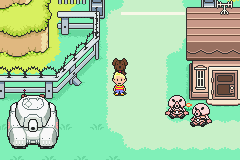
At the Crossroad, you can find where the railway is. The old dirt path has been replaced by a cement path. Leder and his bell tower are nowhere to be found.
The Sunshine Forest is regrowing after the fire that took place 3 years ago. The tree stumps have been removed and flowers are growing. A sign in front of the woods calls the place an “interesting animal reserve,” and indeed, they are quite interesting. The Mighty-Bitey snakes have been turned into “Slitherhens,” retaining a snake’s tail, but having a chicken’s head. “Really Flying Mice” also occupy the area. They’re reminiscent of the flying mice Flint fought, but these ones don’t have wings – they have propeller blades around their necks. If you talk to Isaac at his house, he’ll say, “Regular ol’ mice, run-of-the-mill snakes, and ordinary Dragos… When you think about it, the forest sure was boring until three years ago.” The newest form of Yammonster is the “Grated Yammonster,” who is very tough. If you reach the mountains, you can find moles simply called “Reconstructed Moles” who have drills for hands.
The music that plays in the forest now sounds hostile. The instrumentation is completely synthetic, besides the drums. I really like that random noise at 0:22, which represents the freakishness of everything. The lead synth sounds like something from a rock song, which can be interpreted as the greater strength that these animals now have. They’re powerful, and they’re freaky. I don’t want to look at them.
If you go far enough in the woods, you can visit Lighter and Fuel’s house, which is destroyed, but in a different way. It has been rebuilt since the fire, but there are patches of burnt grass from lightning strikes. Lastly, if you reach the very end of the area and make it to where you started the game at Alec’s house, it will be found completely obliterated by lightning. There is a sign that says: “Coming soon: Oriander Observatory.” The people who resist the Pigmasks are regularly under fire.
The funny thing about this article is that you aren’t forced by the game to experience any of the content that I just wrote about. It could be completely skipped if you didn’t want to read people’s dialogue. The plot doesn’t progress one bit by talking to every NPC; all it does is flesh out the world. The only real information that you wouldn’t be told in a required scene is whose houses were struck by lightning. But if this game didn’t have so much extra dialogue that went into every individual person’s thoughts and feelings or silly gags from animals, this game wouldn’t be half as good as it is; the world of Mother 3 wouldn’t feel half as real.
This concludes part 13 of the analysis.
